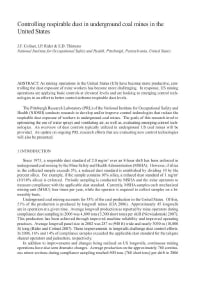Mining Publication: Controlling Respirable Dust in Underground Coal Mines in the United States
Original creation date: September 2008
Authors: JF Colinet, JP Rider, ED Thimons
NIOSHTIC2 Number: 20034607
Proceedings of the 21st World Mining Congress, September 7-11, 2008, Krakow, Poland. Sobczyk EJ, Kicki J, eds., London: Taylor & Francis Group, 2008; :231-238
As mining operations in the United States (US) have become more productive, controlling the dust exposure of mine workers has become more challenging. In response, US mining operations are applying basic controls at elevated levels and are looking to emerging control technologies in an effort to better control airborne respirable dust levels. The Pittsburgh Research Laboratory (PRL) of the National Institute for Occupational Safety and Health (NIOSH) conducts research to develop and/or improve control technologies that reduce the respirable dust exposure of workers in underground coal mines. The goals of this research involve optimizing the use of water sprays and ventilating air, as well as, evaluating emerging control technologies. An overview of dust controls typically utilized in underground US coal mines will be provided. An update on ongoing PRL research efforts that are evaluating new control technologies will also be presented.

NIOSHTIC2 Number: 20034607
Proceedings of the 21st World Mining Congress, September 7-11, 2008, Krakow, Poland. Sobczyk EJ, Kicki J, eds., London: Taylor & Francis Group, 2008; :231-238
- Benchmarking Longwall Dust Control Technology and Practices
- Dust Considerations When Using Belt Entry Air to Ventilate Work Areas
- The Effects of Water Spray Placement for Controlling Respirable Dust and Face Methane Concentrations
- Field Evaluation of Air-blocking Shelf for Dust Control on Blasthole Drills
- Laboratory Evaluation of Shield Dust Entrainment in High-Velocity Airstreams
- Laboratory Testing To Quantify Dust Entrainment During Shield Advance
- An Overview of Fundamental and Emerging Technologies to Monitor and Control Respirable Dust in Underground Coal Mines in the United States
- Performance of a Light Scattering Dust Monitor at Various Air Velocities: Results of Sampling in the Active Versus the Passive Mode
- Research by NIOSH for Controlling Respirable Dust and Methane Gas on Continuous Miner Faces
- Status of a Tapered Element, Oscillation Microbalance-Based Continuous Respirable Coal Mine Dust Monitor